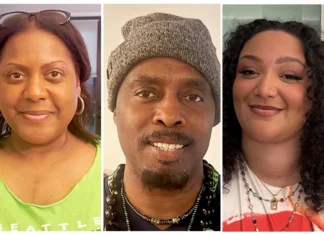
By Aaron Allen, The Seattle Medium
Last week, King County Executive Dow Constantine announced a plan to address the immense demands on the local behavioral health system and its lack of resources that are leaving many people without care.
In Washington state, 71.6 percent (453,000) of adults with mild mental illness, 43.9 percent of adults with moderate mental illness, and 36.6 percent of adults with serious mental illness did not receive mental health treatment in the past year.
Prior to the pandemic, in 2018-2019, 7.9 percent of adults in Washington reported an unmet need for mental health treatment – meaning that they have a perceived or recommended need for mental health treatment or counseling but has not received care — in the past year, which was higher than the national average of 6.2 percent. Among adults in Washington who reported an unmet need for mental health treatment in the past year, 43.7 percent did not receive care because of cost, which was similar to the national average of 39.7 percent.
In 2020, 13.3 percent of children ages 3-17 in Washington received mental health care; compared to 10.8 percent of children in the U.S. Nationally, Many children with mental health needs do not receive mental health care and with new policies political and community leaders are working to change this dynamic.
Joined by Seattle Mayor Bruce Harrell and an assembly of political, civic, and medical leaders, Constantine outlined a regional approach to helping people find help, resources and support.
According to Constantine, the behavioral health system across the state of Washington and in King County has been undervalued and under resourced for decades.
“Our country, our state, our community has yet to replace large archaic hospitals or asylums that closed many decades ago with the community-based care facilities we promised ourselves and that everyone agrees are necessary,” said Constantine.
“Even where the state has invested years ago in facilities within communities the initial investments lack the ongoing funding to maintain the physical facilities, all of this while the treatment of behavioral health itself has long been stigmatized,” Constantine continued. “These longstanding trends now collide with other challenges, the pandemic, the affordable housing crisis that are driving people into the streets, into a homeless crisis and the seemingly unending scourge of racism in America, these emergencies, each terrible on their own, layer atop one another to create yet another crisis one of behavioral health.”
“This newly formed coalition that you see here today has sounded the alarm on the state of our behavioral health system,” he added.
Constantine said that the coalition will work to bolster three areas of the behavioral health system:
Building a regional network of care centers so individuals, families and first responders can access same-day care 24/7 for thousands of people annually.
Restoring and expanding the residential mental health bed capacity. The mid-level care component in behavioral health care that helps people recover for extended periods of time is a core component that ensures care is more effective, more accessible, and more equitable.
Developing the workforce to staff these services sustainably, for patients and providers. Evaluating compensation models and creating recruitment and retention strategies for credentialed and non-credentialed behavioral health workers.
As it relates to behavioral health services in King County, official say that there is just one 16 bed voluntary crisis stabilization unity to serve the entire county, and there is no walk-in behavioral health facility that provides access to someone who need immediate care. The only options that are currently available are overburdened emergency rooms and the resources available through jail.
Washington State does have a network of responders but there are not enough of them to meet the growing need.
“At precisely the moment that we need more mental health and substance use resources more than ever, we lack places for people to go,” says Constantine. “We face dwindling numbers of mental health beds, and we are confronted with a strained workforce and suffer limited options for people in the community to get the care they need when they need it.”
“We cannot accept having a county jail as the main place for people to behavioral health care,” he added. “And right now, it is a fact the jail across the street is the second largest behavioral facility in the state of Washington.”
Harrell believes that the efforts of this collaboration is an essential and vital step in helping people get the help and resources that they need.
“This isn’t unique to Seattle; this is a problem in major cities and even rural cities in America,” says Harrell. “What is incredibly unfortunate is that BIPOC and people of color communities are disproportionately affected by this. What is exciting about this work is the renewed sense of energy. The renewed sense of energy and the doubling down on what we’ve done in the past and the creative way of looking forward with new solutions.”
“Many of you that are hearing my voice right now have been touched or affected by this even in your family, community, you know what we are talking about,” added Harrell. “We are going to help those who have fallen through the cracks in our existing system, and we are going to come up with new policies and solutions.”



